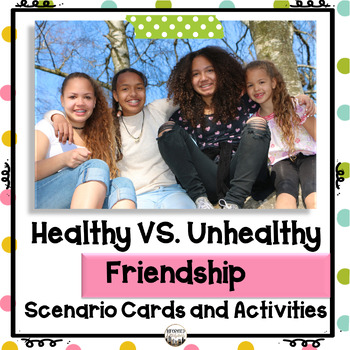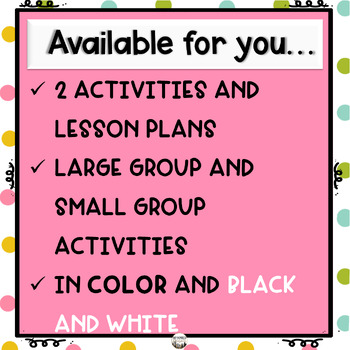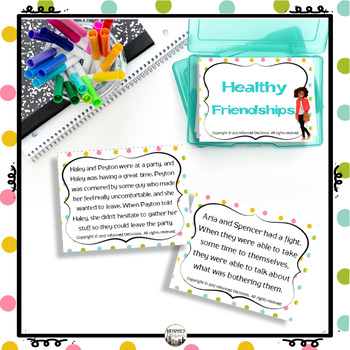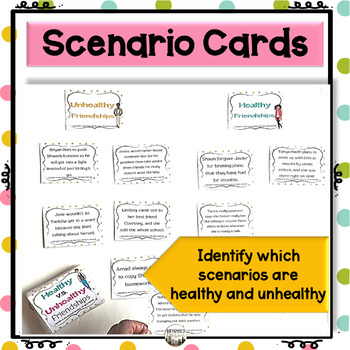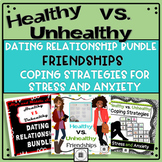Healthy VS. Unhealthy Friendship Activities and Scenario Cards for Teens
- Zip
What educators are saying
Also included in
- This bundle offers interactive activities that will help students understand and explore the difference between healthy and unhealthy dating relations, friendships, and coping skills. There are hundreds of real life scenarios for students to relate to their own lives.>>>>>>>>Price $24.99Original Price $29.00Save $4.01
Description
Do you shake your head in disbelief when you see your students behaving poorly towards their friends? This resource is a great way to support your middle and high school teenagers in being able to recognize the difference between healthy friendships and unhealthy friendships! Friendship skills are the basis for positive, healthy, and constructive relationships for young adults.
This resource offers multiple approaches such as: interactive group activities, scenario cards, worksheets, and guided discussion questions and answers to teach students critical friendship skills including developing healthy relationships, understanding unhealthy relationships, and how to navigate challenging social situations.
This resource includes:
- Educators' Guide
- 2 Interactive activities with step-by-step activity directions
- 104 Friendship Scenario Cards
- 18 Blank Cards to create your own scenarios
- 3 Printable activity reflections
- Large and Mini Header Cards
- 8 Worksheets
- Large and Mini Header Cards
- Black and white version included
>>>>>>>>>>>>>>>>>>>>>>>>>>>>>>>>>>>>>>>>>>>>>>>>>>>>>>>>>>>>>>>>>>>>>>>>>>
ASCA Standards
Behavior: Social Skills
B-SS 2: Create positive and supportive relationships with other students
>>>>>>>>>>>>>>>>>>>>>>>>>>>>>>>>>>>>>>>>>>>>>>>>>>>>>>>>>>>>>>>>>>>>>>>>>>
KEEP IN MIND: Social-emotional activities work best in an environment where relationships have been fostered through team-building activities and positive supportive relationships with your students.
DON’T FORGET, you have an amazing chance to earn Credits for future purchases by leaving comments in my store!
>>>>>>>>>>>>>>>>>>>>>>>>>>>>>>>>>>>>>>>>>>>>>>>>>>>>>>>>>>>>>>>>>>>>>>>>>>
INFORMED DECISIONS PRODUCTS:
Throughout the years of working with youth, there has always been a need for culturally, racially, and developmentally appropriate resources to enhance their social-emotional and life-skills. These resources have authentic real-world examples and have been researched, tested, and received feedback from teens. Resources are designed to meet the needs of teachers, counselors, and administrators. These are great for Advisory, classroom lessons, push-ins, and groups.
>>>>>>>>>>>>>>>>>>>>>>>>>>>>>>>>>>>>>>>>>>>>>>>>>>>>>>>>>>>>>>>>>>>>>>>>>
Let’s Connect!
• Informed Decisions Pinterest
As always, please any questions you have about this resource. Thank you so much!
Copyright © 2017 Informed Decisions
All rights reserved by the author.
Permission to copy for single classroom use only.

